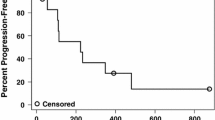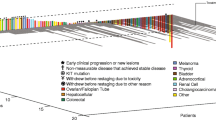Abstract
▴ Bevacizumab, an anti-vascular endothelial growth factor recombinant humanized monoclonal antibody, directly inhibits tumor angiogenesis and hence tumor growth.
▴ First-line therapy with intravenous bevacizumab 10 mg/kg every 2 weeks plus subcutaneous interferon-α-2a 9 million international units three times weekly has been evaluated in two randomized, double-blind or open-label, multicenter phase III trials (AVOREN [n = 649] and CALGB 90206 [n = 732]).
▴ Bevacizumab combination therapy resulted in a median progression-free survival that was significantly (p ≤ 0.0001) longer than that seen with placebo plus interferon-α-2a in AVOREN (10.2 vs 5.4 months) [hazard ratio (HR) 0.63 (95% CI 0.52, 0.75)] and that seen with interferon-α-2a alone in CALGB 90206 (8.5 vs 5.2 months).
▴ Overall survival data in AVOREN and CALGB 90206 are not yet mature. In the interim overall survival analysis in AVOREN, median overall survival was 19.8 months with placebo plus interferon-α-2a, but had not yet been reached with bevacizumab plus interferon-α-2a (HR 0.79 [95% CI 0.62, 1.02; p = 0.0670]).
▴ The overall tumor response rate with bevacizumab plus interferon-α-2a was significantly (p ≤ 0.0001) higher than with placebo plus interferon-α-2a in AVOREN (31% vs 13%) and that with interferon-α-2a alone in CALGB 90206 (25.5% vs 13.1%).
▴ Subgroup analyses in AVOREN suggested that interferon-α-2a dose reductions (to manage grade ≥3 adverse events attributable to the drug) did not compromise the efficacy of combination treatment with bevacizumab plus interferon-α-2a.
▴ The addition of bevacizumab to interferon-α-2a in AVOREN was generally well tolerated. No unexpected/new adverse events were observed; bevacizumab-associated toxicities were generally of mild intensity.


Similar content being viewed by others
Notes
The use of trade names is for product identification purposes only and does not imply endorsement.
References
Mancuso A, Stemberg CN. New treatment approaches in metastatic renal cell carcinoma. Curr Opin Urol 2006 Sep; 16(5): 337–41
Alexandrescu DT, Dasanu CA. Kidney cancer therapy: new perspectives and avenues. Expert Opin Pharmacother 2006; 7(18): 2481–93
Prasad SR, Humphrey PA, Catena JA, et al. Common and uncommon histologic subtypes of renal cell carcinoma: imaging spectrum with pathologic correlation. Radiographics 2006; 26(6): 1795–810
Patel PH, Chaganti RS, Motzer RJ. Targeted therapy for metastatic renal cell carcinoma. Br J Cancer 2006 Mar 13; 94(5): 614–9
Board RE, Thistlethwaite FC, Hawkins RE. Anti-angiogenic therapy in the treatment of advanced renal cell cancer. Cancer Treat Rev 2007 Feb; 33(1): 1–8
Escudier B. Advanced renal cell carcinoma: current and emerging management strategies. Drugs 2007; 67(9): 1257–64
Amato RJ, Jac J. Targeted anti-cancer therapies for renal cancer. Drugs 2006; 66(17): 2161–71
Garcia JA, Rini BI. Recent progress in the management of advanced renal cell carcinoma. CA Cancer J Clin 2007 Mar; 57(2): 112–25
Canada AE, Kirkali Z. Current management of renal cell carcinoma and targeted therapy. Urol J 2006 Winter; 3(1): 1–14
Leibovich BC, Blute ML, Cheville JC, et al. Prediction of progression after radical nephrectomy for patients with clear cell renal cell carcinoma: a stratification tool for prospective clinical trials. Cancer 2003; 97(7): 1663–71
Rini BI. Vascular endothelial growth factor-targeted therapy in renal cell carcinoma: current status and future directions. Clin Cancer Res 2007 Feb 15; 13(4): 1098–106
Hutson TE. Targeted therapy for renal cell carcinoma: a new treatment paradigm. Proc (Bayl Univ Med Cent) 2007 Jul; 20(3): 244–8
Nathan P, Chao D, Brock C, et al. The place of VEGF inhibition in the current management of renal cell carcinoma. Br J Cancer 2006 May 8; 94(9): 1217–20
Sutent 12.5 mg, 25 mg and 50 mg hard capsules. Summary of product characteristics. Sandwich: Pfizer Limited, 2007 Sep
Sutent (sunitinib malate) capsules, oral [prescribing information]. New York: Pfizer Labs., 2007 Oct
Nexavar 200mg film-coated tablets. Summary of product characteristics. New-bury: Bayer pic, 2007 Oct
Nexavar (sorafenib) tablets 200 mg [prescribing information]. West Haven (CT): Bayer Pharmaceuticals Corporation, 2007 Oct
ToriselTM Kit (temsirolimus) injection, for intravenous infusion only. Prescribing information. Philadelphia (PA): Wyeth Pharmaceuticals Inc., 2007 May
Lyseng-Williamson KA, Robinson DM. Bevacizumab: a review of its use in advanced colorectal cancer, breast cancer, and NSCLC. Am J Cancer 2006; 5(1): 43–60
Culy C. Bevacizumab: antiangiogenic cancer therapy. Drugs Today 2005; 41(1): 23–36
Avastin (bevacizumab). Prescribing information. San Francisco (CA): Genentech Inc., 2006 Oct
Avastin 25 mg/mL concentrate for solution for infusion. Summary of product characteristics. Welwyn Garden City: Roche Products Limited, 2008
Roche. Avastin approved in Europe for first-line treatment of patients with advanced kidney cancer [media release; online]. Available from URL: http://www.roche.com [Accessed 2007 Dec 31]
Scott LJ. Bevacizumab: in first-line treatment of metastatic breast cancer. Drugs 2007; 67(12): 1793–9
Croom KF, Foster RH. Bevacizumab: in the treatment of colorectal cancer. Am J Cancer 2004; 3(3): 187–94
Presta LG, Chen H, O’Connor SJ, et al. Humanization of an anti-vascular endothelial growth factor monoclonal antibody for the therapy of solid tumors and other disorders. Cancer Res 1997 Oct 15; 57(20): 4593–9
Wang Y, Fei D, Vanderlaan M, et al. Biological activity of bevacizumab, a humanized anti-VEGF antibody in vitro. Angiogenesis 2004; 7(4): 335–45
Kim KJ, Li B, Winer J, et al. Inhibition of vascular endothelial growth factor-induced angiogenesis suppresses tumour growth in vivo. Nature 1993 Apr 29; 362(6423): 841–4
Gordon MS, Margolin K, Talpaz M, et al. Phase I safety and pharmacokinetic study of recombinant human anti-vascular endothelial growth factor in patients with advanced cancer. J Clin Oncol 2001; 19(3): 843–50
Margolin K, Gordon MS, Holmgren E, et al. Phase 1b trial of intravenous recombinant humanized monoclonal antibody to vascular endothelial growth factor in combination with chemotherapy in patients with advanced cancer: pharmacologic and long-term safety data. J Clin Oncol 2001; 19(3): 851–6
Gaudrealt J, Lieberman G, Kabbinavar F, et al. Pharmacokinetics (PK) of bevacizumab (BV) in colorectal cancer (CRC) [abstract no. PI-98]. Clin Pharmacol Ther 2001 Feb; 69(2): P25
European Medicines Agency. Avastin European Public Assessment Report: scientific discussion [online]. Available from URL: http://www.emea.europa.eu/humandocs/PDFs/EPAR/avastin/17199204en6.pdf [Accessed 2007 Nov 30]
-Mahmood I. Center for Drug Evaluation and Research. Approval package for: application number STN-125085/0 — clinical pharmacology/TOX review [online]. Available from URL: http://www.fda.gov/cder/foi/nda/2004/STN-125085_Avastin_BioPharmr.pdf [Accessed 2007 Nov 28]
Bukowski RM, Kabbinavar FF, Figlin RA, et al. Randomized phase II study of erlotinib combined with bevacizumab compared with bevacizumab alone in metastatic renal cell cancer. J Clin Oncol 2007 Oct 10; 25(29): 4536–41
Yang JC, Haworth L, Sherry RM, et al. A randomized trial of bevacizumab, an anti-vascular endothelial growth factor antibody, for metastatic renal cancer. N Engl J Med 2003 Jul 31; 349(5): 427–34
Hainsworth JD, Sosman JA, Spigel DR, et al. Treatment of metastatic renal cell carcinoma with a combination of bevacizumab and erlotinib. J Clin Oncol 2005 Nov 1; 23(31): 7889–96
Escudier B, Pluzanska A, Koralewski P, et al. Bevacizumab plus interferon alfa-2a for treatment of metastatic renal cell carcinoma: a randomised, double-blind phase III trial. Lancet 2007 Dec 22; 370(9605): 2103–11
Rini BI, Halabi S, Taylor J, et al. Cancer and Leukemia Group B 90206: a randomized phase III trial of interferon-alpha or interferon-alpha plus anti-vascular endothelial growth factor antibody (bevacizumab) in metastatic renal cell carcinoma. Clin Cancer Res 2004 Apr 15; 10(8): 2584–6
Phase III randomized study of interferon alfa-2b with or without bevacizumab in patients with advanced renal cell carcinoma. Identifier: NCT00072046 [online]. Available from URL: http://clinicaltrials.gov/ct/show/NCT00072046 [Accessed 2008 Feb 27]
Escudier B, Koralewski P, Pluzanska A, et al. A randomized, controlled, double-blind phase III study (AVOREN) of bevacizumab/interferon-alpha-2a vs placebo/interferon-alpha-2a as first-line therapy in metastatic renal cell carcinoma [abstract no. 3]. J Clin Oncol 2007 Jun 20; 25 (18S Pt I): 2s–5. Plus oral presentation at the 2007 American Society of Clinical Oncology Annual Meeting; 2007 Jun 1
Bracarda S, Koralewski P, Pluzanska A, et al. Bevacizumab/interferon-alpha2a provides a progression-free survival benefit in all prespecified patient subgroups as first-line treatment of metastatic renal cell carcinoma (AVOREN) [abstract no. 4008]. EJC Supplements 2007 Sep; 5(4): 281–2. Plus poster presented at the 2007 European Cancer Conference; 2007 Sep 23–27; Barcelona
Melichar B, Koralewski P, Pluzanska A, et al. First-line bevacizumab improves progression-free survival with lower doses of interferon-alpha-2a in the treatment of patients with metastatic renal cell carcinoma (AVOREN) [abstract no. 4518]. EJC Supplements 2007 Sep; 5(4): 304. Plus poster presented at the 2007 European Cancer Conference; 2007 Sep 23–27; Barcelona
Rini BI, Halabi S, Rosenberg JE, et al. CALGB 90206: a phase III trial of bevacizumab plus interferon-alpha versus interferon-alpha monotherapy in metastatic renal cell carcinoma [abstract no. 350]. Plus oral and poster presentations at the 2008 Genitourinary Cancers Symposium; 2008 Feb 14–16; San Francisco (CA) [online]. Available from URL: http://www.asco.org [Accessed 2008 Feb 27]
Phend C. Medical news from ASCO GU: bevacizumab-based duo retards metastatic kidney cancer [online]. Available from URL: http://www.medpagetoday.com [Accessed 2008 Feb 27]
Sanborn RE, Sandler AB. The safety of bevacizumab. Expert Opin Drug Saf 2006; 5(2): 289–301
Los M, Roodhart JML, Voest EE. Target practice: lessons from phase III trials with bevacizumab and vatalanib in the treatment of advanced colorectal cancer. Oncologist 2007; 12: 443–50
Feldman DR, Kondagunta GV, Ronnen EA, et al. Phase I trial of bevacizumab plus sunitinib in patients (pts) with metastatic renal cell carcinoma (mRCC). J Clin Oncol, 2007 ASCO Annual Meeting Proceedings 2007 Jun 20; 25 (18S Pt 1): 5099
Sosman JA, Flaherty K, Atkins MB. A phase I/II trial of sorafenib (S) with bevacizumab (B) in metastatic renal cell cancer (mRCC) patients (pts). J Clin Oncol, 2006 ASCO Annual Meeting Proceedings 2006 Jun 20; 24 (18S Pt 1): 3031
Acknowledgments and Disclosures
The manuscript was reviewed by: R.M. Bukowski, Cleveland Clinic Foundation, Cleveland, Ohio, USA; J. Medioni, Georges Pompidou European Hospital, Paris, France; P. Nathan, Mount Vernon Cancer Centre, Northwood, England.
The preparation of this review was not supported by any external funding. During the peer review process, the manufacturer of the agent under review was offered an opportunity to comment on this article. Changes resulting from comments received were made on the basis of scientific and editorial merit.
Author information
Authors and Affiliations
Corresponding author
Rights and permissions
About this article
Cite this article
Frampton, J.E., Keating, G.M. Bevacizumab. BioDrugs 22, 113–120 (2008). https://doi.org/10.2165/00063030-200822020-00004
Published:
Issue Date:
DOI: https://doi.org/10.2165/00063030-200822020-00004




